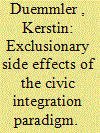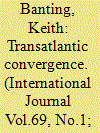|
|
|
Sort Order |
|
|
|
Items / Page
|
|
|
|
|
|
|
| Srl | Item |
| 1 |
ID:
118132


|
|
|
|
|
| Publication |
2012.
|
| Summary/Abstract |
Over the past decades, citizenship studies have explored in detail the various forms of social and civic integration achieved by otherwise illegal residents in contemporary immigration countries. While a great deal of analysis has tended to rest on a dichotomy between formal exclusion on the one hand and informal incorporation on the other, recent studies have begun questioning this dualistic model by examining the formal circuits of incorporation followed by unauthorized denizens at various geographical and institutional levels. Taking cues from this emerging line of research, this article makes three interconnected arguments. First, in contemporary liberal democracies, the rising tension between the illegal status of new immigrants and their limited but effective incorporation does not always pit formal law against informal practices, but is often located within law itself. Second, as a dynamic institutional nexus, "illegality" does not function as an absolute marker of illegitimacy, but rather as a handicap within a continuum of probationary citizenship. An incipient moral economy sees irregular migrants accumulating official and semiofficial proofs of presence, certificates of reliable conduct and other formal emblems of good citizenship, whether in the name of civic honor, in the hope of lesser deportability, or in view of future legalization. Third, such access to formal civic attributes is simultaneously being made increasingly difficult by the intensification of restrictions and controls from immigration, labor, and welfare authorities, thus confronting irregular migrants with the harsh dilemma of being framed as "more illegal" for the very documentary and economic features also assumed to improve their present and prospective civic deservingness.
|
|
|
|
|
|
|
|
|
|
|
|
|
|
|
|
| 2 |
ID:
138935


|
|
|
|
|
| Summary/Abstract |
Civic integration policies have become common in many European states and require that immigrants commit to integrating into the host society. This article draws on a study with young people in Swiss schools and investigates how these new political debates around civic integration find resonance in everyday narratives about immigration. The boundary approach is used as a framework to study the daily (re)production of the ‘Swiss–foreigner divide’. It reveals that assimilation into ‘Swiss culture’ (e.g. speak the local language and conform to social norms) remains a criterion defining who can become a legitimate member of Swiss society. Nonetheless, integration deficits are often perceived as the rule and transformed into a stigma so that ‘foreigners’ are frequently not recognised as legitimate members of society. This study indicates how the Swiss youth in this study legitimise and (re)produce exclusion and how this exclusion is embedded within past and current Swiss immigration policies.
|
|
|
|
|
|
|
|
|
|
|
|
|
|
|
|
| 3 |
ID:
129550


|
|
|
|
|
| Publication |
2014.
|
| Summary/Abstract |
At first glance, Canada and Europe seem to be diverging dramatically in their approach to immigrant integration. While support for a multicultural approach seems to remain strong in Canada, a potent backlash pervades European debates. This paper argues that beneath the image of transatlantic divergence, there are important elements of convergence. First, the retreat from multiculturalism in Europe is more complete at the level of discourse than policy. With a few notable exceptions, multicultural policies have remained stable or even grown stronger since 2000. In many countries, new integration programs are being layered over multicultural initiatives introduced in earlier decades. Second, many of the new integration policies celebrated as evidence of a U-turn away from multiculturalism resemble programs that have long been part of immigrant integration in Canada. As a result, transatlantic convergence is indeed part of the contemporary story. However, there are also limits to this convergence. While some European countries are opting for liberal, voluntary approaches to integration, which can be combined with a multicultural approach to diversity, others are adopting more obligatory, illiberal versions of civic integration that seem inconsistent with the support for diversity central to a multicultural approach.
|
|
|
|
|
|
|
|
|
|
|
|
|
|
|
|
|
|
|
|
|